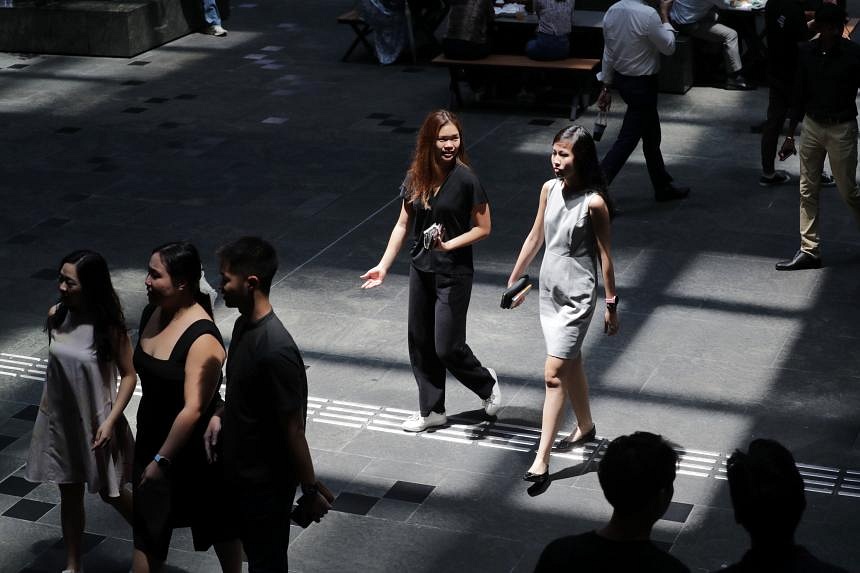SINGAPORE – Significant strides have been made over the past few years to improve gender equality in Singapore, with more female representation in the workplace and in leadership roles.
Singapore ranked eighth worldwide out of 166 countries and first in the Asia-Pacific for having a low level of gender inequality in the most recent United Nations Gender Inequality Index, released in March. The Republic ranked seventh in the previous index, in 2021.
This was highlighted in a new report charting the progress of women’s development – the first since the White Paper on Singapore Women’s Development was published in 2022 – by the Ministry of Social and Family Development (MSF) on May 10. The report will be published annually.
In the two years since the White Paper was published, the report said, Singapore has made further progress in areas such as equal opportunities in the workplace, providing greater caregiver support and strengthening protection against violence and online harms.
“Women’s participation in the labour force remains on the uptrend and women are increasingly represented in traditionally male-dominated occupations such as science, technology, engineering and mathematics, as well as in leadership roles,” it added.
Resident employment rates among women aged 25 to 64 improved over the past decade, increasing from 69.2 per cent in 2013 to 76.6 per cent in 2023. The figure for men in the same age group has been constant at about 89 per cent.
The gap between male and female employment narrowed to a difference of 12.4 percentage points.
More women also took on roles in professional, managerial, executive and technician occupations, growing from 42.3 per cent in 2013 to 46.7 per cent in 2023.
The unadjusted gender pay gap for full-time resident employees aged 25 to 54 narrowed from 16.3 per cent in 2018 to 14.3 per cent in 2023. This is calculated as a straightforward percentage difference between each gender’s average pay.
When comparing men and women with similar characteristics in age, education and occupation, the adjusted gender pay gap was 6 per cent in 2023.
This is down from 6.7 per cent in 2018.
The adjusted gender pay gap reflects unmeasured characteristics, like differences in the effects of parenthood and caregiving responsibilities, which women tend to shoulder more than men.
People’s Action Party Women’s Wing chairwoman Sim Ann said that with more women participating in the workforce, the challenges of juggling different roles – as employee, mother, wife and caregiver – will be experienced more widely among women.
She said: “We care about the lived experiences of women, even as Singapore turns in a good performance on measures of gender equality.”
Promoting mental health and well-being among Singaporean women is also important – a recent survey by the PAP Women’s Wing and NTUC U Women and Family found that only 21.8 per cent of female respondents prioritise their well-being in their life choices.
As the demands on caregivers grow due to Singapore’s ageing society, financial support is available to defray long-term caregiving costs.
This includes the Home Caregiving Grant, which was increased in 2023 to $400 a month from $200 previously, with more help provided to eligible lower-income households. The number of beneficiaries has increased since the scheme started in 2019, with about 44,000 individuals receiving the grant in 2023.
Violence against women
MSF said in the report that strategies have been implemented to address violence and safeguard women across various fronts – homes, schools, workplaces and in public. “Moving forward, efforts to bolster safety measures will continue and evolve across multiple domains,” it said. Nevertheless, sexual and hurt offences against women still occur, it said.
The number of female victims of rape increased from 4.8 per 100,000 in 2013 to 15 per 100,000 in 2022. The number of female victims of outrage of modesty remained relatively stable over the same period, with 58.4 victims per 100,000 in 2022.
Through legislation and enforcement, the Government continues to take seriously any incident of sexual violence against women, including rape and outrage of modesty, MSF said.
Some of the recent changes in legislation to champion the protection of victims include raising the minimum imprisonment term for outrage of modesty from two to three years in 2022, and introducing a new sentencing option in 2024 to allow serial serious sex offenders to be detained until they do not pose a threat to public safety.
The Women’s Charter was also amended in 2023 to empower family violence victims to better protect themselves, strengthen the Government’s ability to intervene in family violence cases, and raise penalties for offenders.
For example, the amendments allow victims to apply for orders to disallow the perpetrator to remain in areas frequented by the victim, and prohibit him from communicating with the victim.
The report noted that online harms have emerged as a new form of threat to the safety of women. A 2023 survey by non-profit organisation SG Her Empowerment (SHE) showed that 22 per cent of female youth reported experiencing sexual harassment online, compared with 12 per cent of their male counterparts.
The Government introduced a suite of legislative measures to deal with harmful online content and behaviour, including that which is targeted at women and girls, MSF said in the report.
The Online Criminal Harms Act was passed in 2023 to better protect Singapore users of online platforms from criminal activities like the communication of voyeuristic materials and online child exploitation.
A Code of Practice for Online Safety was also introduced in July 2023 to require designated social media services to put in place measures to minimise Singapore online users’ exposure to harmful online content, including sexual or cyber-bullying content.
A resource package has been developed to help professionals identify inappropriate behaviours early and prevent youth sexual offending. The Government aims to train half of all school and community counsellors by end-2024 in using the resources, and the remaining half by end-2025.
MSF said all Singaporeans also have “a role to reinforce a culture of safety and respect through their everyday actions and habits”.
It said: “Men and women can actively speak out against disrespect and objectification of women. Together, we can create an environment where our women and girls feel safe and respected.”
More work lies ahead
Although efforts to uplift and support women have been encouraging, there is still a long way to go, said women’s organisations.
SHE’s chairwoman Stefanie Yuen Thio said mindsets need to change, so that men and women are not entrenched in traditional gender stereotypes.
There is still a preference for promoting an “ambitious and assertive” individual over a “caring and nurturing” one, with people identifying the former as male, according to a recent social experiment by SHE.
Ms Yuen Thio said: “As mindsets underpin societal changes, we must change them if we are to overturn the biases which impact women at home, work and in society.”
Chief executive of Singapore Council of Women’s Organisations Koh Yan Ping told The Straits Times that gaps in gender equality still exist in the leadership representation of women.
While the number of women sitting on the boards of the top 100 Singapore Exchange-listed companies has increased, it is not very significant, and progress is still slow, she said.
“Although setting targets is an important move and we are seeing the numbers move, we shouldn’t be happy to say that we have achieved the target and therefore have reached the level where we think there is enough women representation,” she said.
Violence against women remains a concern and an urgent area of work, notwithstanding tougher criminal penalties and laws, Ms Yuen Thio said. The increasing objectification of women online, fuelled by social media, and the cloak of anonymity that online platforms provide perpetrators further exacerbate the issue, she said.
She said developments in generative artificial intelligence also increase the problem – more than 90 per cent of deepfake porn videos are of women.
“There’s a lot to do, but by working together – women and male allies – focusing on real actions we all can take, we can make a more equitable society for everyone, women and men,” she said.


